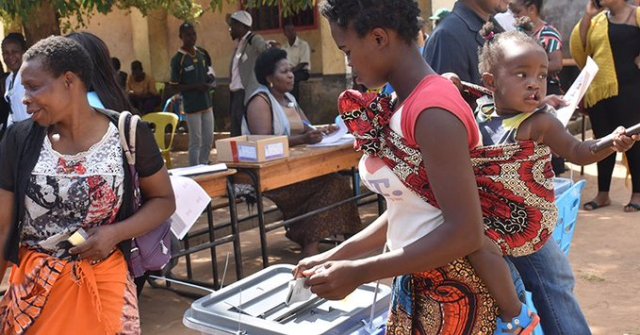 Voting in Malawi [photo: Commonwealth Secretariat]
Voting in Malawi [photo: Commonwealth Secretariat]
The opposition leader Lazarus Chakwera lived up to his biblical namesake by winning the presidential election on 27 June – more than a year after apparently being beaten by the incumbent, Peter Mutharika, 78. In a first for Africa, the losing candidate of a disputed election won the rerun after Malawi’s constitutional court annulled the initial result in February because of blatant vote-tampering in the May 2019 poll. ‘I do feel like Lazarus,’ Chakwera said. ‘I’ve come back from the dead.’
Chakwera and his running mate Saulos Chilima, who was Mutharika’s vice-president from 2014 to 2018 before becoming his rival, both disputed the first election, in which Mutharika apparently received 38.6% of the vote to Chakwera’s 35.4%, winning by just 159,000 ballots, with Chilima trailing on 20.2%. Thousands of supporters of Chakwera’s Malawi Congress Party (MCP) poured on to the streets after the Malawi Electoral Commission (MEC) ratified Mutharika’s apparent victory, occupying a presidential complex in the capital, Lilongwe, as anger mounted. Mutharika’s Democratic Progressive Party (DPP) urged the opposition to accept defeat but despite the police firing tear-gas and bullets, the unrest and protester numbers grew and the army had to step in. By August, demonstrations, organised by the Human Rights Defenders’ Coalition, were drawing more than 100,000 people in Blantyre, the commercial capital. Targets now included Jane Ansah, head of the MEC.
In annulling the first election, the constitutional court’s 500-page ruling shone a spotlight on ‘widespread’ irregularities and some patently dubious processes, such as unauthorised use of Tipp-Ex correction fluid, duplicate result sheets and unsigned forms. The Nyasa Times said judges found 54 clearly altered sheets of tallied results. (The Financial Times called Mutharika the ‘Tipp-Ex president’.) A DPP candidate was beaten up after being caught disbursing cash to voters. DPP supporters reportedly celebrated before the MEC had announced results, Malawi’s Nation reported. The court also instituted a new electoral system, in which the winner had to secure an absolute majority of more than 50% (and thereby encouraging alliances), rather than the old first-past-the-post system. The ruling was upheld by the supreme court, which called Mutharika’s grounds for appeal fictitious and embarrassing.
The 65-year-old Chakwera won 58.57% of the vote on 23 June, the MEC announced. A former Pentecostalist preacher, he declared: ‘My victory is a win for democracy and justice.’ It was also a groundbreaking win for an opposition candidate (although Kenya’s 2017 presidential election was annulled, Uhuru Kenyatta won again after his opponent, Raila Odinga, boycotted the rerun).
The upset prompted huge celebrations in Lilongwe, Chakwera’s stronghold. However, Mutharika – whose late brother, Bingu wa Mutharika, was president from 2004 to 2012 – claimed there had been irregularities. The DPP called for the second election to be annulled, claiming monitors had been excluded from polling stations and 1.5m votes had been influenced by ‘violence and intimidation’.
Henry Chingaipe, a political analyst, dismissed Mutharika’s allegations as a ‘total fabrication’ and ‘kicks of a dying horse’. Chingaipe, who heads Malawi’s Institute for Policy Research and Social Empowerment, said: ‘In the history of this country, there has been no election as transparent as this, especially in the management of results.’ Gift Trapence, who heads the Human Rights Defenders Coalition, said of Mutharika: ‘He has always been in denial. But reality will catch up with him soon.’ He was one of several critics of Mutharika to be arrested this year.
The first election raised questions about the usefulness of foreign election observers. The interim statement of the Commonwealth Observer Group, led by the former South African president Thabo Mbeki, was lavish in its praise, noting: ‘The tallying process largely followed stipulated procedures … counts in general were transparent … election officials conducting the process in a deliberate and careful manner, following the prescribed procedures … high level of confidence in the integrity, capacity and competency of MEC.’ The African Union’s mission also ‘had not notes [sic] any serious concerns with the process’. The European Union’s observers found them to be ‘well-managed, inclusive, transparent and competitive elections’ and also praised the NEC, though it acknowledged that ‘problems with results sheets are causing challenges’.
Ray Hartley and Greg Mills, of South Africa’s Brenthurst Foundation, were scornful about those supposedly keeping watch, saying the Malawi court ruling threw ‘a harsh light on foreign election observers, who praised the election and understated its weaknesses’. Chilima was harsh, calling it ‘election tourism’. He added: ‘If we want to continue with them, let’s redefine their role. It should not be a tick-the-box exercise.’ Chakwera was equally scathing: ‘They scratch the surface, and yet they think they know what they are doing … an exercise in futility.’ He added: ‘All they want to do is maintain the status quo and find excuses for things that are going wrong.’
Luke Tyburski, writing in Foreign Policy before the court ruling, was not convinced there had necessarily been electoral fraud but said the silence of those supposedly monitoring the election ‘represents a serious failure of the international community and speaks to a mounting crisis of credibility for election observers’. He admitted: ‘Observer missions, as they are currently configured, have proved themselves marginal at best and futile at worst, but they could make significant headway by integrating all available data and by more actively presenting credible evidence in the public eye.’
Ultimately, the story of the two elections has burnished the reputation of Malawi’s democracy and its forthright, independent judiciary, despite its status as consistently one of the world’s 10 poorest countries. The many observers who flocked to the country and gave the election their seal of approval, however, come out of it significantly tarnished.



